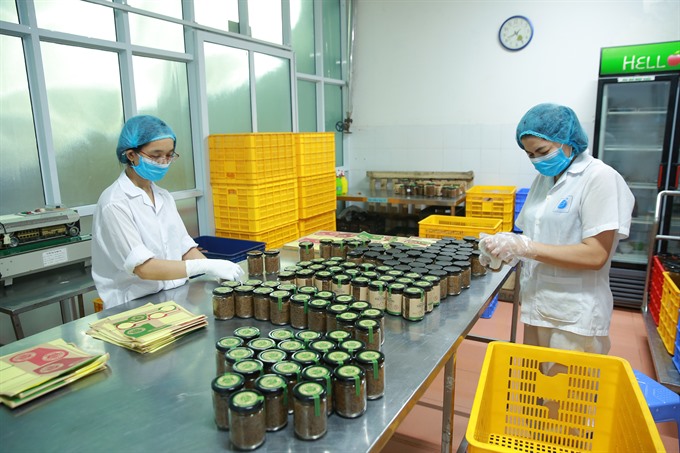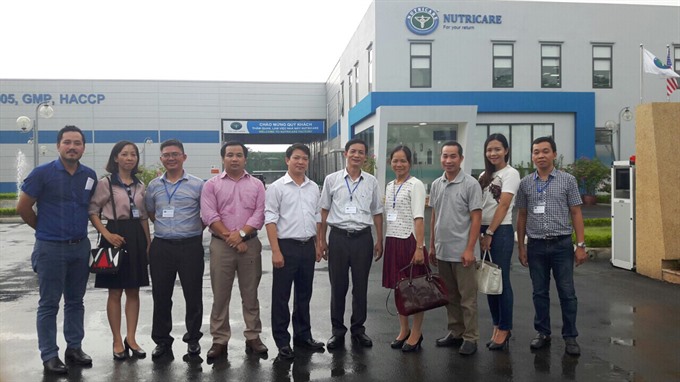 Economy
Economy

Established in 2007, the Hà Nội Business Incubator (HBI) has helped 30 start-ups and created 1,000 jobs.
 |
| Workers of Smiley Mushrooms pack products. VNS Photo Trương Vị |
by Yến Vy
The Hà Nội Business Incubator (HBI), part of the European Union-funded supporting programme for the Vietnamese private sector, has helped 30 start-ups and created 1,000 jobs.
The HBI project was officially launched in November 2007 under the management of the Hà Nội Department for Planning and Investment’s Small- and Medium-sized Enterprises Promotion Centre.
The incubator has 10 production units, five product development kitchens, one micro-bio laboratory, one chemical laboratory, one sensory testing laboratory, and three pilot plants for processing meat, fruits, vegetables and dairy products.
It has also created relationships with a number of financial institutions, banks, universities and industry associations. It also became a member of the Asia Pacific Incubator Network (APIN) and the United Kingdom Incubator Association.
Mushrooming
"The start of my career began when I attended a meditation class for three years. My meditation teacher, who suffered from cancer, had been healthy until now thanks to regular meditation and vegetarian diets using mushrooms," Phạm Hồng Vân, founder and CEO of Smiley Mushrooms, told Việt Nam News.
“After that I started to study mushrooms,” she said.
She said she learned about HBI in 2012 and officially joined the programme in 2016 after being supported in processing and preserving technology by the HBI staff.
“The incubator gives us a competitive advantage as we are supported with the cost of renting factory space, utilities and especially the basic production infrastructure, which might require a start-up to spend tens of billions of Vietnamese đồng. It is too hard for a young business,” she said.
HBI provides support for start-ups and young businesses in the food processing and packaging sector to minimise risk and promote the growth and competitiveness of businesses.
The incubator also provides workshops and facilities to assist companies overcome challenges in their early stages.
It also provides support in technologies, consultation, business networking and office services, support in training and improving the quality of human resources.
"Start-up businesses in the agricultural and manufacturing sectors see little success with operating periods of less than five to eight years. Therefore, this was one of the challenges for enterprises in this field. For start-ups in the field of technology, they could see success within one year," Vân said.
 |
| The management board of HBI visits the Nutricare Co Ltd., a start-up which graduated from HBI. VNS Photo |
After more than 10 years of operation, many ideas supported by HBI have been commercialised, such as canned fish, fish cake, squid cake, hibiscus wine, jelly candy, vegetable oil, chili sauce, garlic sauce and dried litchi.
Many graduates formed the organisational structure for production and business and brand identification in the market. There are companies that have operated with good results such as Nutricare Co Ltd, which started with three co-founders and now has grown to a company with 2,000 employees, or Smiley Mushrooms, the winner of the Start-up Việt 2017 competition.
"One barrier when entering hi-tech agricultural production as well as processing production was capital, without this, it was difficult for businesses to make breakthroughs," Vân said.
As mentioned above, start-ups in this industry face many difficulties, so Vân hopes that the incubation period would be at least five years instead of the current three years.
“For any business, at any stage, there are certain difficulties and challenges. We are a sustainable manufacturing enterprise so we only hope that the law and mechanism will be stable and can create conditions for the business to develop,” said the CEO.
“At present, there are a lot of fees that start-up companies have to pay,” she said.
Speaking about the strengths and weaknesses of Vietnamese start-ups, Hồ Sỹ Thường, HBI project manager, said that Vietnamese businesses paid attention to learning and investing in knowledge before starting operations.
They also had good ability in grasping trends.
“Việt Nam is in a period of golden population. The young generation provides enough factors to develop strongly so the country’s entrepreneurial spirit had never been stronger,” said Thường.
However, there are limitations such as lack of management skills and effective business models.
Limited resources and flexible thinking sometimes caused founders or CEOs to lack strategy and vision, he noted. There were also limitations in the ability to apply science and technology in business, affecting competitiveness.
“The business incubator model has seen strong development recently and has been contributing positively to businesses, however, it has not matched the scale and speed of development in Hà Nội,” Thường said.
"There needs to be policies supporting the development of this model."
The project manager asked the local authority to pay more attention to the role and contribution of business incubators in promoting enterprise development.
"There should be a specific mechanism and preferential policies for enterprise incubators," Thường said.
"There should also be investment in human resources, especially those operating business incubators besides knowledge in business; operators also need vision and orientation so that they could manage effectively.
"There should be more communication about business incubators to communities so that start-ups could learn about and access practical support from the incubators." VNS




